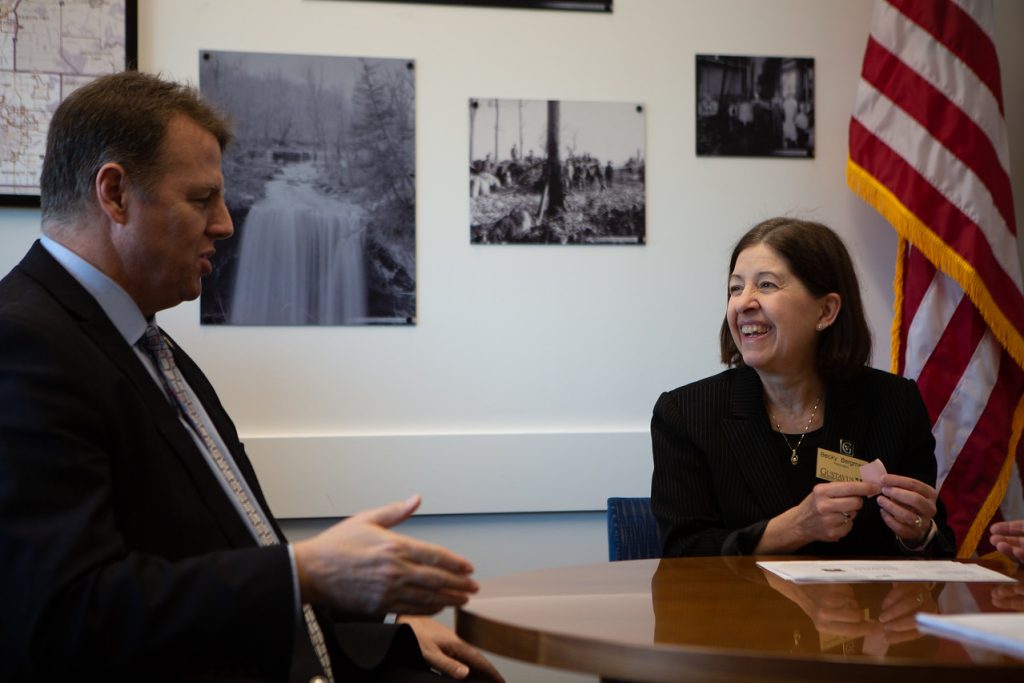Appendix B: Tips for Effective Advocacy
Figure B.1 Former Gustavus President Becky Bergman meets with State Senator Nick Frentz in his office about the Minnesota State Grant

- Do your research. Know who you are communicating with before you go to meet them or write to them (this also helps ensure that you are talking to the right person!). What political party are they affiliated with? How long have they served in their position? How much do they know about the topic you will be talking to them about? Are you going to need to inform them about it? What is their position on the topic? Are you going to be persuading them or activating them? If you are meeting with or writing to a legislator, are they on the committee or subcommittee that has jurisdiction over the issue? You should also know something about the policy. Is there a current proposal on the table?
- Identify yourself. You should use your real name and contact information when you are communicating with policy makers. If you are writing to a legislator and you live in the person’s district, you should identify yourself as a constituent. Legislators are much more likely to pay attention to constituents than they are to listen to people who don’t live in their districts. If you are affiliated with an interest group or organization and are lobbying on their behalf, you should also share that information. Identifying the group helps to communicate the political power behind the group, which makes the group more effective.
- Be polite and professional. I’m a little old fashioned here, but I think that if you want to be taken seriously, you need to look and act professional. That means being dressed appropriately (you don’t need to wear a suit, but you shouldn’t show up in sweatpants or leggings), being on time to any scheduled meetings, and being courteous–especially to staff. Use their formal titles until they tell you not to (Representative X, Senator Y, etc.). It doesn’t help your cause to be super argumentative.
- State your request/position clearly. Right after you introduce yourself, you should very clearly explain your request. What issue are you addressing and what is your position on that issue? You should be able to do this in 1-2 sentences and without using any technical jargon. Remember, if you say, “hi I’m Kate and I’m here for Day at the Capitol” it doesn’t tell them anything useful…every day is Day at the Capitol when you work in the legislature! Ideally you will have done some research ahead of time about who you are speaking/writing to so you will know if they have supported your position in the past or opposed it. If they are a supporter, be sure to thank them for their past support.
- Develop your argument. Whether you are writing or speaking, you should offer one or two supporting points for your position. Use evidence to support these points that is relevant and valued by your audience. If you’re making your case to a conservative lawmaker, you shouldn’t rely on evidence from a very liberal source because that won’t be persuasive to them. You should never lie or mislead your audience because that destroys your credibility as an advocate. If you’ve used AI in doing any of your research, remember to double check it for accuracy. You are responsible for the accuracy of the information you provide to legislators. If you provide inaccurate information, it will reflect poorly on your credibility.
- Explain your connection. The most effective advocacy will be personal. You should describe why this issue is important to you personally. Tell a story about how you or someone you know has been affected by the issue. Personal examples are persuasive to those who oppose your position and they are helpful to those who support it.
- Listen. When you are meeting with a policymaker in person, listen politely to what they have to say. You might even want to take notes so that you can remember what they say. If they ask you a question and you don’t know the answer, don’t make something up. Instead, tell them it’s a good question and that you’ll get back to them with an answer. Write the question down and then take the time after your meeting to find the answer and communicate it to the person (or their staff). Legislators tend to be pretty social and so they can sometimes get a little off track when you are meeting with them face-to-face. It’s okay to gently redirect them to the topic you want to talk about if they start to talk about something else. Remember that the people you talk to or write to are real people with real feelings. They might not agree with you on everything, but that doesn’t mean that you can’t try to find common ground.[1]
- Say thanks. You should end every communication with policymakers with thanks. They are very busy people. If you’re meeting with someone in person, thank them for their time and follow up with a thank you note in the mail. If you are writing to them, thank them for taking the time to read and respond to your letter/email.
- One really common situation is for the legislators to start talking about something you have in common related to your home district, like the high school you both attended. When this happens, you can guide them back to your topic by saying something like, "I agree that our high school was great and, if fact, the education I got there helped prepare me to succeed in college. Now that I'm in college, I realize that it's not enough for students to be academically prepared but it's also important that college is affordable. And that's why I'm here today to advocate on behalf of the Minnesota State Grant Program to help make college affordable for all Minnesota students." ↵

